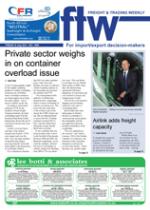The question of transporters’
liability has become a subject of
some considerable debate in FTW
and its electronic sister publication,
FTWOnline.
First out of the blocks was Andre
du Sart of Aon South Africa who
said that the Consumer Protection
Act (CPA) had a major impact on
the way transporters communicated
their services to customers. Also in
the way their standard trading terms
and conditions were drawn to the
attention of the customer to ensure
they were clearly understood from an
insurance perspective.
He pointed out that “the Act
will mean that, in the case of
transporters, their standard trading
terms and conditions can no longer
absolve them from liability and
responsibility for cargo unless this
has been properly disclosed to
customers in plain language and
that the conditions are fair, just and
reasonable”.
Alexander Robertson of
cargoconsult then joined the debate,
adding that Du Sart’s comments “are
very important, and of which we
must take note”.
He also said that it must be
remembered that the case of
Anderson Shipping vs Polysius found
that a transporter was permitted to
contract out of all liability. A case,
he added, that “was not well received
in the insurance market both locally
as well as abroad”.
Perhaps, he suggested, “this
needed some urgent attention from
the Maritime Law Association
(MLA)”.
This collision between the
Anderson Shipping vs Polysius
case and the CPA urged FTW to
seek clarification on the issue, and
we approached lawyer Andrew
Robinson, a director of Norton Rose
(formerly Deneys Reitz) and former
chairman of the MLA.
He saw the debate falling into two
issues.
The first was the Anderson
Shipping case.
“This decision of the Appeal Court
(as the Supreme Court of Appeal was
then known) in this case simply held
that the Praetor’s Edict, which held
ship owners, stable keepers and innkeepers
strictly liable for any loss or
damage to goods entrusted to them,
was not applicable to public carriers
by land,” Robinson told FTW. “It has nothing to do with
the ability (or otherwise) of
public carriers to contract
out of liability – indeed
in the Anderson case the
contract between the parties
was oral.”
But, Robinson added,
what the court did make
comment on was that the
liability of both public and
private carriers would be
based on whether or not
the loss or damage was
caused wrongfully, either
intentionally or negligently.
“The ability to regulate
liability by way of contract,”
he added, “stems from
the common law that
recognises that parties can
regulate their affairs by
way of written or oral (or a
combination of both) terms.
There are constraints to this
ability both at common law
and by way of the operation
of statutes. Generally
speaking contracts that are
contrary to public policy
may not be enforceable, nor
will a term of a contract be
enforceable if it offends the
provisions of a statute such
as the CPA.”
This matter of the
CPA and transporters is,
therefore, the second issue.
It is based on the fact that
transporters usually contract
with their customers on the
basis of terms set out in
standard form contracts – the
wording of which is usually
contained or referred to in
credit application forms and
the transporters’ quotations,
consignment notes and
invoices.
“Whether or not the
standard terms will regulate
the contractual conduct of
the parties,” said Robinson,
“will depend upon whether,
on the facts, they were
agreed to prior to or at the
time the transporter and
its customer concluded the
relevant contract.”
As for the CPA, he added,
this will have no application
in circumstances where the
customer, whether a natural
person or a business, has
assets or an annual turnover
in excess of R2 million.
And, with regard to
insurance advice, where
the transporter is Financial
Advisory and Intermediary
Services (FAIS)-compliant
(as some are), they will be
exempted entirely because
the FAIS Act already
provides adequate consumer
protection.
“What transporters (and
similar service providers,
including freight forwarders
and warehousemen) need
to do,” said Robinson, “is
to ensure that they obtain
suitable information from
the customer in order to
assess whether or not they
fall within the under-R2-m
‘danger zone’ or not. The
transporter will then have
to work out the commercial
viability of doing business
with such a customer and
whether or not it will have
a separate set of standard
trading terms that will apply.
“My guess is that most
transporters will simply
rely on their usual trading
terms and take the chance.
However, it may well be
to the transporter’s benefit
to have the trading terms
reviewed so that the material
terms are clearly set out,
including those terms where
liability is limited and where
claims must be lodged or
prosecuted within restricted
time limits.”
Obviously, Robinson
added, transporters that
offer advice on insurance (as
many do) need to make sure
that the person within the
organisation that offers the
advice is FAIS-compliant.
“My preference,” he said,
“would always be that they
utilise the services of any
one of the many competent
South African goods-intransit
insurance brokers.”
Legal minds dissect the issue of transporters’ liability and the CPA
08 Jul 2011 - by Alan Peat
0 Comments
FTW - 8 Jul 11

08 Jul 2011
08 Jul 2011
08 Jul 2011
08 Jul 2011
08 Jul 2011
08 Jul 2011
Border Beat
Featured Jobs
New
New
New
